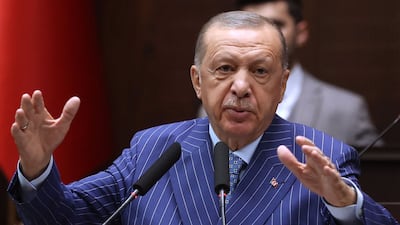Turkish President Recep Tayyip Erdogan will meet Finnish and Swedish leaders to discuss their Nato membership requests at the start of an alliance summit in Madrid.
Nato leaders will urge Mr Erdogan to lift his veto over Finland and Sweden's applications to join the military alliance when they meet in Spain for a three-day summit on Tuesday.
Mr Erdogan will attend talks with the leaders of the two Nordic countries, as well as Nato, Turkish presidential spokesman Ibrahim Kalin said.
The Finnish presidency also confirmed the meeting, tweeting: “President (Sauli) Niinisto will meet tomorrow in Madrid with Turkish President Erdogan, Swedish Prime Minister (Magdalena) Andersson and Nato Secretary General (Jens) Stoltenberg.”
Finland and Sweden’s membership requests and Turkey’s objections are expected to be a central theme of the summit, which runs from June 28 to 30.
They applied for Nato membership in response to Russia's invasion of Ukraine. But the applications have drawn opposition from Turkey, which has been angered by what it says is Helsinki and Stockholm's support for Kurdish militants and arms embargoes on Ankara.
Speaking to broadcaster Haberturk, Mr Kalin said he and deputy foreign minister Sedat Onal would also attend another round of talks with Swedish and Finnish delegations in Brussels on Monday.
“There will be a four-way summit at the leader level with the attendance of our president in Madrid upon the request of the Nato secretary general,” he said.
Mr Kalin said Mr Erdogan attending the talks “does not mean we will take a step back from our position”.
He said Turkey and the Nordic countries had largely agreed on issues and would be in a better position in Madrid if they could agree on them during talks on Monday.
“We have brought negotiations to a certain point,” he said of Monday's discussions. “It is not possible for us to take a step back here.”

But Soner Cagaptay, a Turkey analyst at the Washington Institute think tank, said there was “nearly zero chance” that the issue will be resolved in Madrid.
Mr Erdogan has told Sweden that he has not seen any “tangible” moves to address Turkey’s concerns, his office said.
In a phone conversation with Prime Minister Magdalena Andersson, he called for “binding commitments” from Sweden, as well as a “concrete change of attitude” in the country’s approach to fighting terrorism.
Any Nato membership requires approval of all 30 members of the alliance. Turkey has been a Nato ally for more than 70 years and has the alliance's second biggest army.
On the agenda
At the summit, leaders also hope to agree to provide more military aid to Ukraine, increase joint defence spending, cement a new resolve to tackle China's military rise and put more troops on standby to defend the Baltic region.
Taking place in the shadow of Russia's war in Ukraine, the Madrid gathering comes at a pivotal moment for the transatlantic relationship after failures in Afghanistan and internal discord during the era of former US president Donald Trump, who threatened to pull Washington out of the nuclear alliance.
Although British and US officials have advised against a Baltic request for permanent multinational forces in the region, the summit is likely to settle on a compromise of promising rapid reinforcements.
Germany has said it will put more troops at the ready to defend Lithuania should Russia seek to seize Nato territory and Britain is expected to do the same for Estonia, while Latvia is looking to Canada to pledge more soldiers there.
Mr Stoltenberg on Monday told the Financial Times that Nato would “significantly reinforce” its defences in eastern Europe.
“We never share the details of operational plans,” he said. “But I can assure you that we have been able to protect countries bordering Russia for decades, adjusting our presence in light of the threat assessment. We have done that before and we will do it again.”
Spain, whose King Felipe VI will host a dinner for leaders, is also pushing for more Nato focus on the southern flank to address migration and militant groups in the Sahel region of Africa.
The leaders of Australia, New Zealand, Japan and South Korea are expected to attend part of the Madrid summit, part of a broader US strategy for a more assertive western presence in the Indo-Pacific region to counter China.


